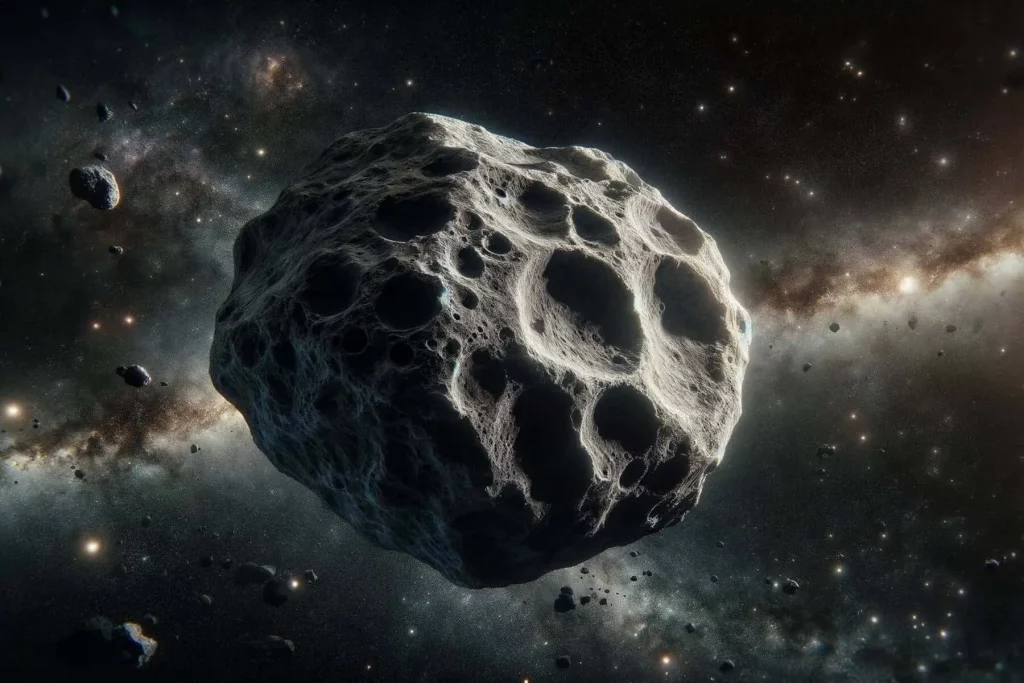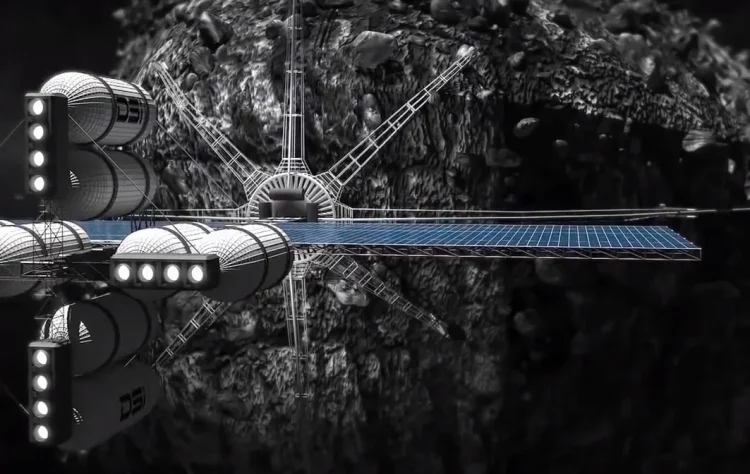Introduction
The concept of asteroid mining has transitioned from science fiction to an exciting, real-world possibility. As the need for rare and precious metals grows on Earth and space exploration advances, mining asteroids for valuable resources could offer a solution to our planet’s increasing demand for minerals. With advancements in space technology and the growing interest of private companies, asteroid mining may soon become a cornerstone of future space exploration. This article explores the potential of asteroid mining, the challenges and opportunities it presents, and how it could reshape resource extraction, particularly in the context of rare metals and sustainable space development.
1. What is Asteroid Mining?
1.1 Defining Asteroid Mining
Asteroid mining involves extracting resources—such as metals, water, and other materials—from asteroids in space. These small, rocky celestial bodies are rich in valuable elements, many of which are rare or difficult to extract on Earth. Asteroids can contain everything from gold and platinum to iron, nickel, and even water, which could be used for fuel in future space missions.
Asteroids are categorized into three main types based on their composition:
- C-type (carbonaceous): Rich in water, carbon, and minerals.
- S-type (silicaceous): Contain metals like iron, nickel, and silicate minerals.
- M-type (metallic): Composed mostly of metals like iron, nickel, and platinum group metals (PGMs), which are of significant interest for mining.
1.2 The Potential of Asteroids as a Resource
Some asteroids are estimated to contain resources worth billions of dollars, with the possibility of extracting materials that are rare or increasingly expensive on Earth. For instance, it is estimated that the asteroid 241 Germania could yield up to $66 trillion worth of resources, including nickel, iron, and cobalt. Similarly, asteroids like 511 Davida and 52 Europa could potentially offer platinum, gold, and other precious metals that are in high demand.
The extraction of these materials could provide significant benefits not only for the space industry but also for the global economy, as demand for rare metals for use in electronics, batteries, and other high-tech industries continues to rise.
2. Why is Asteroid Mining Important?
2.1 Meeting Earth’s Resource Needs
Earth’s resources are finite, and as the world’s population grows, the demand for metals such as lithium, cobalt, and platinum—key components in electronics, solar panels, and electric vehicle batteries—continues to increase. Asteroids, however, offer an almost inexhaustible supply of these materials. As terrestrial mining becomes more expensive and environmentally harmful, asteroid mining could provide a more sustainable and efficient way to source critical resources without depleting Earth’s natural reserves.
- Rare Metals for High-Tech Industries: Asteroids contain metals like platinum, iridium, and gold, which are vital for industries like electronics, telecommunications, and renewable energy. These materials are often limited on Earth, leading to supply chain disruptions and rising costs.
- Helium-3 and Space Energy: Some asteroids may contain Helium-3, a rare isotope that could potentially be used in future nuclear fusion reactions, providing a powerful and sustainable energy source. The mining of this isotope could revolutionize energy production on Earth and in space.
2.2 Space Exploration and Sustainability
Asteroid mining could play a pivotal role in the future of space exploration. Space missions, particularly those aimed at Mars or beyond, require vast amounts of fuel, water, and materials for construction. Mining asteroids for these resources could help create self-sustaining colonies and missions that are less reliant on Earth for supplies.
For example, extracting water from asteroids can be used for producing rocket fuel via electrolysis (splitting water into hydrogen and oxygen). This technology could significantly reduce the cost and complexity of space missions by enabling spacecraft to refuel and resupply in orbit, rather than returning to Earth for refueling.

3. The Technologies Driving Asteroid Mining
3.1 Robotic Mining and Automation
Mining asteroids will require advanced robotic technologies capable of performing precise operations in harsh and distant environments. Robotic spacecraft would need to land on, extract, and transport materials from asteroids to nearby space stations or Earth. These systems would likely employ remote sensing tools like laser scanners and spectrometers to identify valuable resources before attempting extraction.
- Automated Drilling and Extraction: Innovations in autonomous robotics are crucial for the extraction process. Machines would need to drill into asteroid surfaces, separate valuable minerals, and store them for transport. This would involve developing highly durable, self-sustaining robots capable of operating in the vacuum of space.
- In-Situ Resource Utilization (ISRU): One of the main goals of asteroid mining is to use the resources found on the asteroid itself to facilitate the mining operation, reducing the need for materials to be sent from Earth. Technologies like ISRU could allow for the conversion of materials directly into fuel or construction materials, enabling more efficient mining operations.
3.2 Advanced Propulsion Systems
To reach asteroids and conduct mining operations, spacecraft will need advanced propulsion systems. Current propulsion technology, such as chemical rockets, is not efficient enough for repeated missions to distant asteroids. New propulsion technologies, such as ion drives or nuclear propulsion, are being researched to make asteroid mining missions more feasible and cost-effective.
- Ion Propulsion: This method of propulsion uses charged particles to generate thrust, offering higher efficiency than conventional chemical rockets. It could enable spacecraft to travel further into the solar system and reach asteroids more quickly.
- Nuclear Propulsion: Although still in the experimental stages, nuclear propulsion could provide the necessary power for long-duration missions and asteroid mining expeditions, making deep space travel more practical and efficient.
4. The Economic and Legal Implications of Asteroid Mining
4.1 Commercial Investment and Private Sector Involvement
Asteroid mining is no longer the realm of just government space agencies; private companies like SpaceX, Planetary Resources, and Blue Origin are actively investing in the development of space mining technologies. In fact, the commercial sector is expected to drive much of the growth in asteroid mining. With billions of dollars potentially at stake, the private sector’s involvement is crucial to bringing this technology to fruition.
Investment from tech giants and space startups is also likely to spur innovation and competition, leading to faster development and more efficient mining technologies.
4.2 Legal and Regulatory Challenges
The commercialization of asteroid mining raises important legal questions. Under international law, space is considered a “global commons,” meaning that no single country has ownership rights over celestial bodies. However, the 1967 Outer Space Treaty, signed by many nations, prohibits the appropriation of celestial bodies by any government. This means that while nations cannot claim sovereignty over asteroids, private companies are still navigating complex regulatory frameworks to establish property rights and claims over mined resources.
There is also the issue of ensuring that asteroid mining is conducted ethically and sustainably. As with resource extraction on Earth, there must be guidelines to prevent exploitation and environmental damage in space. Governments and international organizations will need to establish legal frameworks to ensure that asteroid mining remains peaceful, equitable, and beneficial for all of humanity.
5. Challenges Facing Asteroid Mining
5.1 Distance and Accessibility
Asteroids are scattered across the solar system, and many are located far beyond the reach of current spacecraft technology. Even the closest asteroids are millions of kilometers away, requiring long-duration missions and advanced propulsion systems to reach them. The vast distances involved make asteroid mining a complex and costly endeavor.
5.2 High Costs of Space Missions
Launching spacecraft into space and conducting mining operations on asteroids requires significant financial investment. Developing the necessary technologies, conducting missions, and establishing a space mining infrastructure will be extremely costly in the short term. While the potential rewards are enormous, the upfront costs may make it difficult for smaller companies or nations to participate in asteroid mining ventures.
6. The Future of Asteroid Mining
6.1 Building a Space Mining Industry
In the coming decades, asteroid mining could evolve into a fully-fledged industry. Advancements in technology, coupled with growing commercial interest, will likely make asteroid mining more viable. As more missions are launched and more asteroids are mined, economies of scale will reduce the cost of operations and make it easier to extract resources profitably.
6.2 Asteroids as a Gateway to Deeper Space Exploration
Asteroid mining could also serve as a stepping stone for future space exploration. The ability to extract resources from asteroids may enable deeper space missions to Mars, the moons of Jupiter, and beyond. By establishing a sustainable presence in space through asteroid mining, humanity could explore the solar system more efficiently and independently.
7. Conclusion
Asteroid mining holds enormous potential to reshape the way we think about resource extraction and space exploration. With the right technological advancements and international cooperation, asteroid mining could become a key industry that supplies valuable metals, fuels, and other resources that support the growth of space-based economies and provide solutions to Earth’s growing resource challenges. However, significant challenges remain, from technical limitations and high costs to legal and ethical questions. As we move closer to the reality of asteroid mining, the next big frontier in space exploration, one thing is clear: the future of space-based resource extraction could be closer than we think.











































Discussion about this post